Addison Lee could provide your next ambulance
Plus: Phone retailer warns people not to use their phone outside their Oxford Street shop — and a £5.5m flat in Mayfair.
It’s August and depending on where you are in the capital, London is either half empty or overflowing with Spanish children on school trips. London Centric isn’t taking a break. But we know a lot of you will be on much-needed holidays, so we may be a little quieter while we work on some knotty long term investigations about power and money in the capital. Thanks to all the paying subscribers who make this work possible.
Today, though, we’ve got an exclusive story about how the overstretched London Ambulance Service is increasingly relying on taxi firm Addison Lee to get people to hospital for urgent care. Scroll down to read the story — and find out which parts of the capital are most affected.
If you want to get in touch with London Centric directly then message us on WhatsApp or email.
What’s caught our eye:
London-based restaurant group Dishoom has been valued at £300m in its latest investment round as it prepares to launch branches in the US. We were going to write about how Dishoom is joining Gymkhana and Ambassadors Clubhouse in taking high-end Indian food to the US but the New York Times got there first. There’s a reason private equity investors like Dishoom: Its notoriously long queues (which are apparently already filled with Americans) result in customers spending big money. Its parent company made an operating profit of £8.1m on sales of £116m in the last financial year.
Currys has placed a marker on the pavement outside its Oxford Street store warning people to “Mind the Grab” and not use their phone in public for fear of it being snatched.
On one level this is a PR stunt by the electronics retailer — you’re now reading about them and thinking of them as a company that cares for its customers — but there’s also a good reason why this is smart marketing right now. Standing outside the Currys store on Wednesday afternoon, we talked to person after person who all said they knew someone who’d had a phone snatched. Gavin Johnson, 47, said: “I don’t have my phone out in the street in central London. I cycle and I can see how easy it is to take a phone when someone’s on the edge… I don’t think much is being done to stop phones being taken, it’s embarrassing how bad it is.” We’ve previously covered how mobile phone theft in London is big business driven by transnational criminal gangs, with Algerian markets increasingly replacing China as the most common destination.
There was a strong reaction to last week’s piece on the ways that Transport for London’s contactless payments system is being abused by fare dodgers, including the cases of French lunch discount cards being used to gain access. We’re lucky to have some of the smartest commenters in the country and we recommend reading their extra explanations beneath the original piece about the tradeoffs involved.
Preposterous property of the week
There’s a basic rule of thumb we use when browsing the sillier end of London’s property listings: If there’s more toilets than bedrooms, no one is actually going to properly live there. So it is with this two bedroom, three toilet flat in Mayfair, which could be yours for a mere £6.5m. Anyone who buys this apartment on a side street near Green Park will also gain access to a neighbouring "business-focused private members club" being founded by Robin Birley. He’s the man behind 5 Hertford Street, the favoured hang-out for a certain type of celebrity, and Brexit-friendly politicians Liz Truss and Nigel Farage.
Why your next 999 call could see you head to hospital in an Addison Lee
By Julian Amani
The warning signs were there for Rina when she could not pick up her grocery bags off the floor of her west London home. For several days in January, she had been dealing with worsening stomach pain. “I kind of thought nothing of it, you know, perhaps I've got a stomach bug or whatever,” she explained.
That evening, the pain grew worse and worse. It kept her up throughout the night, and in the early morning, she dialled the NHS’ non-emergency 111 number. After a brief phone call, the health advisor decided that she needed to be seen by a doctor at an out-of-hours surgery and told Rina to call again if the pain got worse.
Within ten minutes she was back on the phone, the pain now excruciating as she lay on the floor. The health advisor got a paramedic on the line who decided it was an emergency. “You need an ambulance, but we don’t have any,” they told her.
In desperation Rina proposed trying to make her own way to hospital but the paramedic was against it, suspecting she may have appendicitis. Instead, they apologised and offered a solution to get around the ambulance shortage: “We’re going to send you a taxi, it will be there in five minutes.”
Rina’s case is not as rare as you might think. Over 16,000 taxis were dispatched by the London Ambulance Service in 2024 following a phone call requesting urgent medical help, London Centric can reveal, up from just a few thousand prior to the pandemic.
Our findings, released following a Freedom of Information request, show that while the ambulance service has used taxis for at least the last decade, it used to be mainly a way to get people to hospital for pre-planned elective surgery. Now, taxis are increasingly used as a mainstream option for taking people in pain to hospital following a call to 999 or 111 for urgent medical help.
Patients travelling include people who have overdosed or been poisoned, and those who have been electrocuted.
Selected reasons for London Ambulance Service sending a taxi instead of an ambulance following a request for emergency care (Jan 2024 - April 2025)
Chest pain / chest discomfort (non-traumatic) - 1927 taxi transfers
Falls - 1292
Haemorrhage (bleeding) / lacerations - 1211
Heart problems - 382
Overdose / poisoning (ingestion) - 374
Mental health problems / suicide attempt - 352
Convulsions / fitting - 240
Pregnancy / childbirth / miscarriage - 67
Carbon monoxide / inhalation - 19
Electrocution / lightning - 11
To meet the growing demand, in recent months the Ambulance Service agreed a £3.6m contract with private hire operator Addison Lee to take people to hospital over the coming years. If non-emergency trips for scheduled elective surgery are taken into account, the number of taxis sent in place of ambulances more than doubled to 40,000 trips last year.
When deployed correctly taxis can be a cheaper, more flexible way to relieve the strain on the overstretched ambulance service and free up resources for more serious cases. The risk is what happens if the triage process goes wrong, leaving someone in pain stuck in traffic with an untrained taxi driver to provide medical care.
“Using taxis means we have more ambulances available for our sickest patients”
The London Ambulance Service’s chief medical officer, Dr Fenella Wrigley, said taxi journeys have partly increased as a result of the ambulance service taking on more responsibility for responding to non-emergency 111 calls in London in recent years. At the same time, many people who have rung 999 in the belief they need emergency help getting to hospital are finding themselves getting into the back of a private hire Addison Lee cab.
“We will never send a taxi to patients with life-threatening illnesses or injuries but using taxis means we have more ambulances available for our sickest patients,” said Wrigley. “After a detailed assessment by a clinician in our 111 or 999 control room, we may occasionally send a taxi to transport patients to the hospital or other treatment centres if they do not need medical care on the way and can’t get there any other way.”
The capital’s ambulance service is under enormous stress. Over the winter there are regularly queues outside London hospitals that are unable to take in patients, leaving ambulances and paramedics out of action for hours while they waited to hand over patients. Staff recruitment is a challenge, with many of the capital’s paramedics coming from Australia. Meanwhile the Met police have increasingly stepped back from handling mental health calls, leaving the NHS to pick up the slack.
In Rina’s case, she did need hospital treatment and was grateful that the taxi saved a much longer wait for an ambulance, enabling her to receive faster care. Rounds of blood tests and strong pain killers followed before the surgical team arrived a few hours later, diagnosing her with epiploic appendagitis, a rare condition that causes acute stomach pains. She made a full recovery within two weeks.
“We need to be better at… understanding that people don’t really know what’s wrong with them”
Not all cases are as simple, according to one paramedic working in the London Ambulance Service who spoke to London Centric anonymously. He said a growing problem is people overstating the severity of their symptoms in a bid to be transferred into hospital. This then places enormous stress on the call handlers trying to decide who should get one of the limited number of ambulances.
“Because there is a lot of pressure on the NHS, they [the people phoning for emergency care] don’t want to be at the bottom of the queue,” said the paramedic.
He warned this diverts ambulances, paramedics, and important resources away from people who really need them but said he had sympathy with the patients. “They’re not trying to lie, they’re not trying to do the system over, they’re just trying to navigate the system and get help.”
The paramedic said the biggest problem lies in the triage process, where clinicians and call handlers decide who needs an ambulance, who could have a taxi, and who should be told to make their own way to hospital. He said this is the “toughest” job in the ambulance service and he has sympathy with colleagues but they sometimes struggle to turn down requests for an ambulance: “We need to be better at, not necessarily saying no, but understanding that people don’t really know what’s wrong with them.”
London Centric relies on word-of-mouth to reach new audiences. If you want to support our work please forward this email to a friend, share it on social media, or post a link to it in your group chat.
If you have any thoughts about this story, please leave a comment online.
If you want to get in touch with us directly then message us on WhatsApp or email.



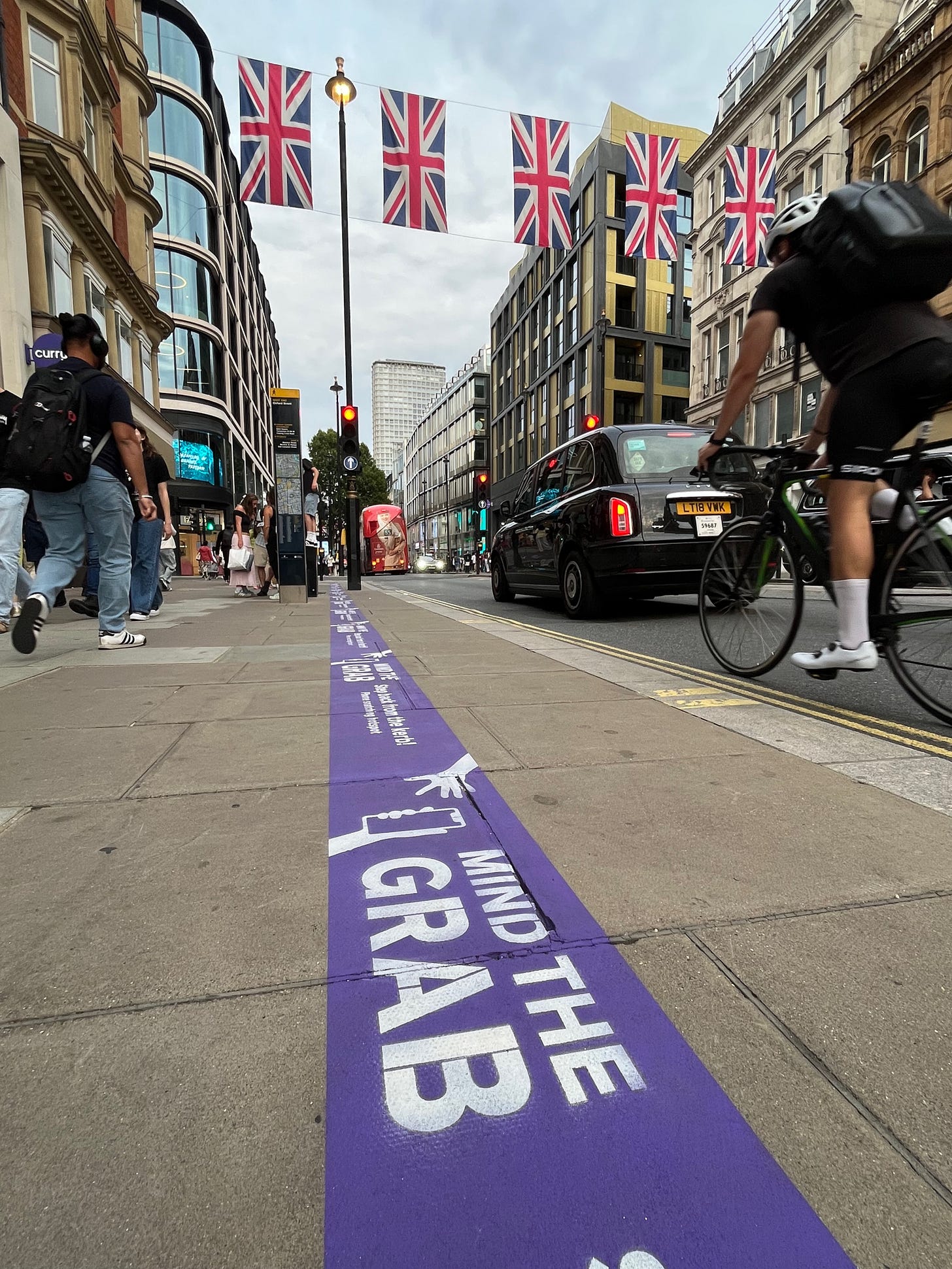

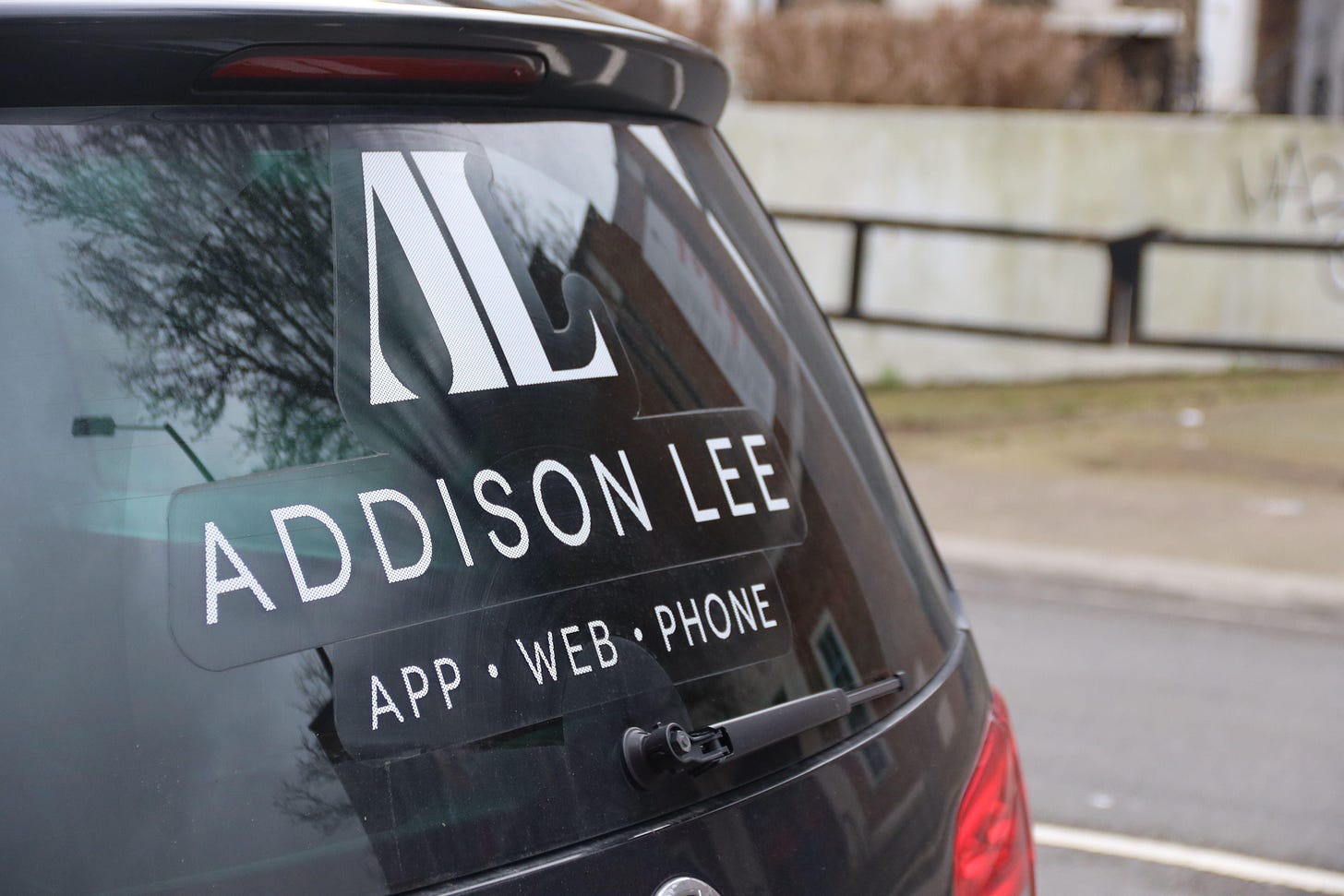
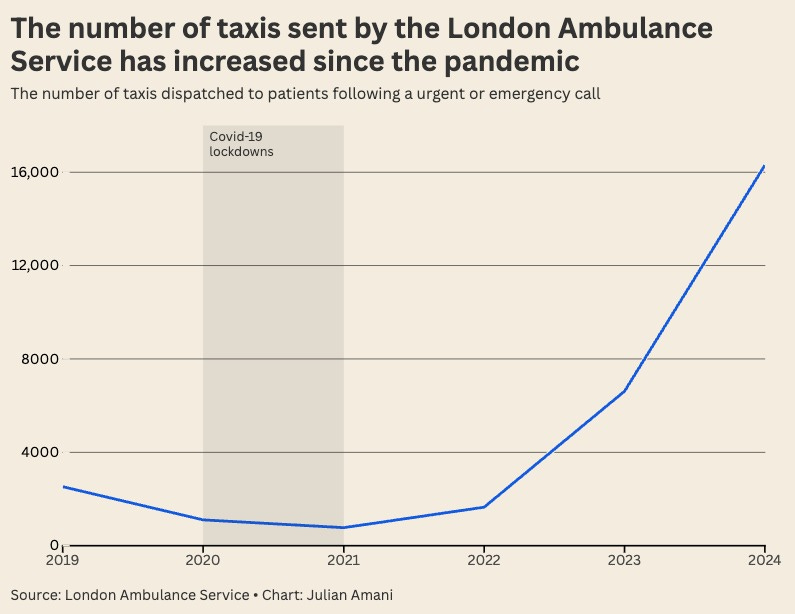
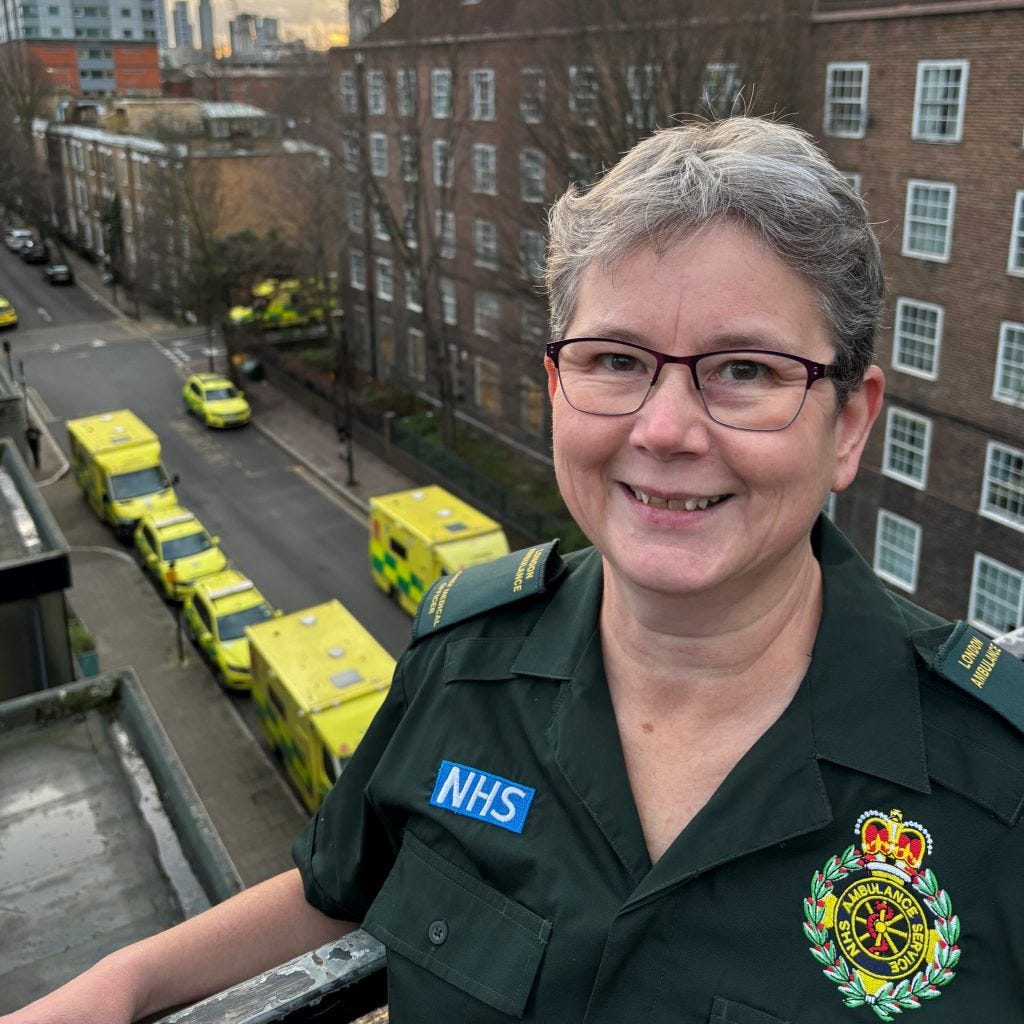
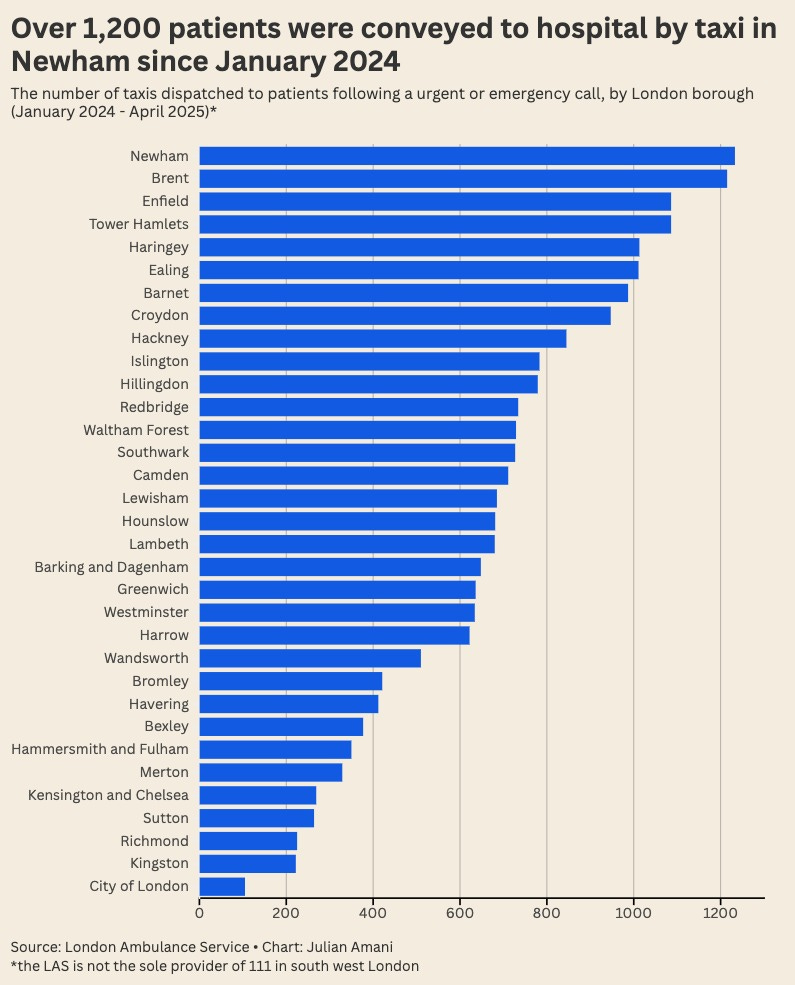
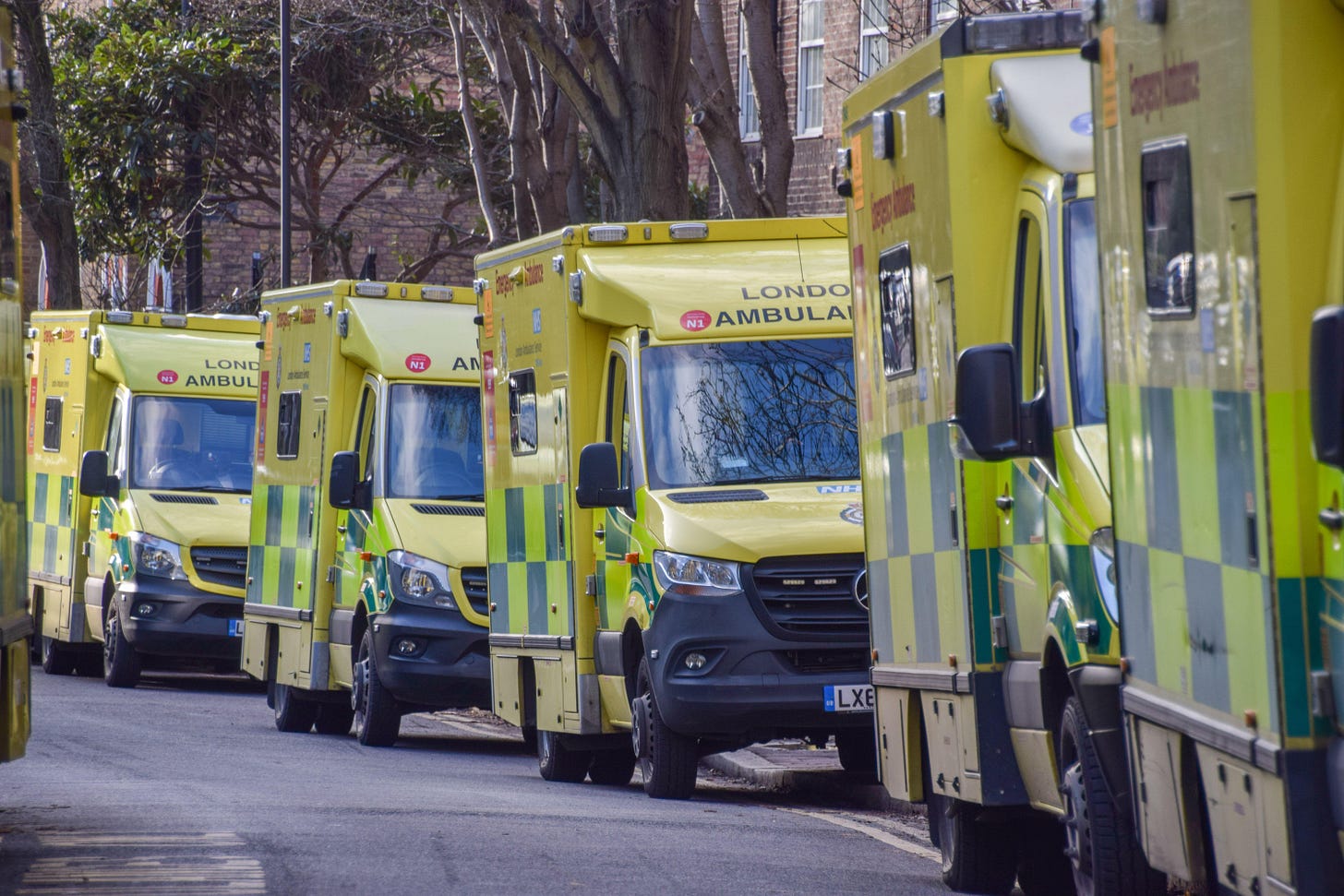
Isn’t this a sensible response to the problem? Few people in London have access to private cars so sending a taxi is a fast way of getting someone to hospital. Better than a four hour wait. I would be interested in another graphic: do those with highest use of taxis have longer or shorter waits for ambulances?
Not related to this edition but one of London Centric's long running stories - I was on a bus that was stuck in traffic yesterday because it couldn't use the bus land on Westminster Bridge, as it was blocked by ice cream vans and an enormous fleet of cycling rickshaws.
It's jaw-dropping how powerless the authorities are to do anything about this. For me, it rivals the phone-snatching epidemic when it comes to torpedoing confidence in the Met police.